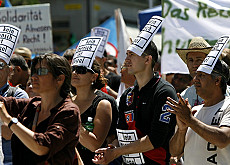
Swiss demonstrate in support of refugees

Some 3,500 people took part in a demonstration in Bern on Saturday to mark the 28th National Refugee Day under the slogan "Stop Exclusion".
In a keynote address on Friday ahead of the national day of action, Swiss President Micheline Calmy-Rey called on the Swiss population to show more respect and openness for refugees and asylum seekers.
Members of human rights and church organisations, as well as unions and political parties, attended the demonstration in the capital, demanding “fundamental rights for all”. Events were also held simultaneously in 200 other towns across the country.
In her speech on Friday, Calmy-Rey urged Switzerland to again accept quotas of refugees as it had done in the 1990s.
The Swiss president said in view of the present low numbers of requests for asylum in Switzerland, it was an “opportune moment” for the government to renew its welcome policy.
This strategy was suspended in 1998 following the Balkans crisis. From 1950 to 1995 Switzerland had regularly welcomed groups of refugees from different parts of the world fleeing wars or persecution, such as from Hungary, Tibet, southeast Asia, Chile or the former Yugoslavia states.
Calmy-Rey said that of the 35 million people who have been driven from their homes by war or human rights abuses, only a small number arrive in Switzerland. In 2006 there were around 23,000 refugees and 10,000 asylum seekers.
Humanitarian tradition
The government recently rejected a proposal by Calmy-Rey to welcome a contingent of 500 Iraqi refugees in response to a request by the UN High Commissioner for Refugees.
This decision should not be understood as a total rejection of reaccepting contingents of refugees, said the president, who welcomed the initiative of the Federal Refugee Commission, which is currently drawing up a concept to renew this policy.
“Switzerland has a long tradition of welcoming refugees, which helped form its international reputation,” she explained. “But if this tradition is not translated into action, it risks becoming a myth like William Tell.”
The president also used the occasion to criticise a people’s initiative launched in May by a group of rightwing politicians against the building of minarets, which she described as “an electoral farce and danger”.
“It encourages exclusion. It prevents dialogue with the Muslim community – a religious minority in Switzerland – and strengthens fundamentalist circles,” she added.
swissinfo with agencies
There were 10,537 asylum applications in Switzerland in 2006, compared with an average of 25,860 over the past ten years and a peak of 48,057 in 1999.
According to the Federal Migration Office, approximately 10% of asylum seekers are recognised as refugees.
There were 8,859 official departures by asylum seekers from Switzerland in 2006, compared with an average of 21,819 over the past ten years and a peak of 48,974 in 2000.
Since 1997 some 65,000 people from 21 countries have benefited from repatriation assistance from Switzerland. Last year some 1,535 people received assistance.
Almost 68% of voters approved a tightening of the asylum law in September 2006. It was the ninth time since 1984 that Switzerland’s asylum law had been amended.
Switzerland faces similar migrant challenges to those of other countries in Europe. In recent years it has received large numbers of asylum seekers, the majority of who do not qualify for refugee status or residence in Switzerland.
Return migration has in the past decades emerged as an important element of many governments migration policy, alongside strong border controls and effective asylum procedures.
According to the authorities, comprehensive return packages with generous incentives (housing, medical and financial assistance) still turn out to be much cheaper than prolonged stays in Switzerland or forced returns.
Swiss parliament last year adopted proposals to tighten the asylum laws. These would allow foreigners awaiting deportation to be detained for longer periods, cut social welfare payments to rejected asylum seekers, and exclude from asylum procedures people arriving without valid identity papers.

In compliance with the JTI standards
More: SWI swissinfo.ch certified by the Journalism Trust Initiative





























You can find an overview of ongoing debates with our journalists here . Please join us!
If you want to start a conversation about a topic raised in this article or want to report factual errors, email us at english@swissinfo.ch.